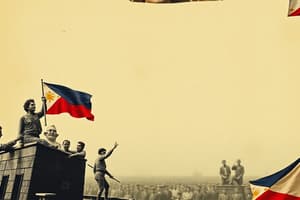Podcast
Questions and Answers
What is a key characteristic of sovereignty?
What is a key characteristic of sovereignty?
- Temporary
- Flexible
- Divisible
- Universal (correct)
Which term describes a government where power is held by a single central authority?
Which term describes a government where power is held by a single central authority?
- Unitary Government (correct)
- Oligarchy
- Confederation
- Federal Government
In which form of government do citizens have a limited role and power is concentrated in one individual?
In which form of government do citizens have a limited role and power is concentrated in one individual?
- Autocracy (correct)
- Theocracy
- Democracy
- Oligarchy
What is the defining feature of a confederation?
What is the defining feature of a confederation?
Which type of leadership allows a monarch to exercise supreme and unlimited powers?
Which type of leadership allows a monarch to exercise supreme and unlimited powers?
What characterizes an oligarchy?
What characterizes an oligarchy?
What is the meaning of 'De Jure' in the context of legitimacy?
What is the meaning of 'De Jure' in the context of legitimacy?
Which of the following countries exemplifies a federal government system?
Which of the following countries exemplifies a federal government system?
What is the definition of a state?
What is the definition of a state?
What event led to the United States recognizing the Philippines as an independent state?
What event led to the United States recognizing the Philippines as an independent state?
Which element is NOT considered a fundamental component of a state?
Which element is NOT considered a fundamental component of a state?
What distinguishes a nation-state from a state?
What distinguishes a nation-state from a state?
How is a nation defined in the context of politics?
How is a nation defined in the context of politics?
What was the purpose of the Treaty of Manila in 1946?
What was the purpose of the Treaty of Manila in 1946?
What are the three island groups that the Philippines is divided into?
What are the three island groups that the Philippines is divided into?
Which of the following is an element of the state?
Which of the following is an element of the state?
What describes a De Facto leader?
What describes a De Facto leader?
In a presidential system, who is the head of the government?
In a presidential system, who is the head of the government?
Which of the following is an example of inherent power of the state?
Which of the following is an example of inherent power of the state?
What is eminent domain?
What is eminent domain?
What is the primary function of taxation?
What is the primary function of taxation?
Which statement about parliamentary systems is true?
Which statement about parliamentary systems is true?
Which aspect does police power NOT typically regulate?
Which aspect does police power NOT typically regulate?
What does globalization primarily represent?
What does globalization primarily represent?
Study Notes
State
- A country organized as a formal political community controlled by one government.
- The Republic of the Philippines is recognized as a sovereign state in Southeast Asia.
- Comprises 7,107 islands covering over 300,000 square kilometers.
- Divided into three major island groups: Luzon, Visayas, Mindanao.
Philippine Independence
- U.S. recognized the Philippines as an independent state on July 4, 1946.
- Recognition was proclaimed by President Harry S. Truman.
- Treaty of Manila (1946) formally ended U.S. sovereignty, establishing Philippine independence.
Nation
- Defined as a large group sharing the same race, language, traditions, and history, not limited to a geographic area.
Nation-State
- A politically organized entity where a state is identified with a nation.
- Often dominated by a single nation.
- The Philippines is classified as a nation-state following the Treaty of Manila.
Elements of the State
- People: Inhabitants or population linked by common interests.
- Territory: Geographical area includes aerial, fluvial, and terrestrial domains.
- Sovereignty: Supreme authority within territorial boundaries, characterized as absolute, permanent, universal, inalienable, and exclusive.
- Government: Institutions managing state functions and organization.
Forms of Government
-
By Distribution of Power:
- Unitary Government: Central authority holds political power (e.g., Philippines).
- Confederation: Voluntary association of independent states (no existing country).
- Federal Government: Division of power between national and local governments (e.g., USA, Canada).
-
Citizen Participation:
-
Autocracy: Power held by a single individual with limited citizen role (e.g., Kuwait, China).
- Absolute Dictatorship: Single leader glorified, no accountability to people (e.g., North Korea).
- Absolute Monarchy: Supreme power rests with an inherited ruler (e.g., Saudi Arabia).
-
Oligarchy: Power concentrated in a small elite group (e.g., Russia, Iran).
-
Legitimacy
- De Jure: Legitimacy according to law, officially sanctioned.
- De Facto: Practical legitimacy not necessarily sanctioned by law.
Executive and Legislative Relationship
- Presidential System: President is both head of government and state, separate from legislature (e.g., Philippines).
- Parliamentary System: Prime Minister heads government and is part of the parliament, often with a monarch as a figurehead (e.g., Germany).
Inherent Powers of the State
- Powers retained by the state that cannot be taken away:
- Police Power: Government’s ability to enact laws for public welfare.
- Eminent Domain: Government’s right to take private property for public use with compensation.
- Taxation: System of collecting funds from individuals and businesses to support government operations.
Globalization
- Described as worldwide, all-encompassing, and universal, impacting nations and states by increasing international interactions and dependencies.
Studying That Suits You
Use AI to generate personalized quizzes and flashcards to suit your learning preferences.
Related Documents
Description
This quiz explores the concepts of state, nation, and nation-state, with a focus on the unique characteristics of the Republic of the Philippines. Learn about its independence and the elements that define its political community. Test your knowledge on the historical significance of the Philippines within the context of Southeast Asia.




